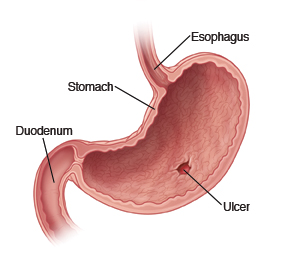Gastritis or Ulcer, No Antibiotic Treatment

Gastritis is irritation and inflammation of the stomach lining. This means the lining is red and swollen. It can cause shallow sores in the stomach lining called erosions. An ulcer is a deeper open sore in the lining of the stomach. It may also occur in the first part of the small intestine (duodenum). The causes and symptoms of gastritis and ulcers are very similar.
Causes and risk factors for both problems can include:
-
Long-term use of nonsteroidal anti-inflammatory drugs (NSAIDs) such as aspirin and ibuprofen
-
H. pylori bacteria infection
-
Tobacco use
-
Alcohol use
-
Certain other conditions such as immune disorders, certain medicines such as high-dose iron supplements, and street drugs such as cocaine
Symptoms for both problems can include:
-
Dull or burning pain in the upper part of the belly
-
Loss of appetite
-
Heartburn or upset stomach
-
Frequent burping
-
Bloated feeling
-
Nausea with or without vomiting
You likely had an assessment to help find the exact cause and extent of your problem. This may have included a health history, exam, and certain tests.
Results showed that your problem is not from H. pylori infection. For this reason, you don't need antibiotics as part of your treatment.
Whether your problem is gastritis or an ulcer, you will still need to take other medicines. You will also need to follow instructions to help reduce stomach irritation so your stomach can heal.
Home care
-
Take any medicines you’re prescribed exactly as directed. Common medicines used to treat gastritis include:
-
Antacids. These help neutralize the normal acids in your stomach.
-
Proton pump inhibitors. These block your stomach from making any acid.
-
H2 blockers. These reduce the amount of acid your stomach makes.
-
Bismuth subsalicylate. This helps protect the lining of your stomach from acid.
-
Don't take any NSAIDs during your treatment. If you take NSAID to help treat other health problems, tell your healthcare provider. They may need to adjust your medicine plan or change the dosage.
-
Don’t use tobacco. Also don’t drink alcohol. These products can increase the amount of acid your stomach makes. This can delay healing. It can also worsen symptoms.
Follow-up care
Follow up with your healthcare provider, or as advised. In some cases, you may need more tests.
When to seek medical advice
Call your healthcare provider right away if any of these occur:
-
Fever of 100.4°F (38°C) or higher, or as directed by your healthcare provider
-
Stomach pain that gets worse or moves to the lower right part of belly
-
Extreme tiredness (fatigue)
-
Weakness or dizziness
-
Continued weight loss
-
Frequent vomiting, blood in your vomit, or coffee-groundlike substance in your vomit
-
Black, tarry, or bloody stools
-
Symptoms get worse or you have new symptoms
Call 911
Call 911 if any of these occur:
-
Chest pain appears or worsens, or spreads to the back, neck, shoulder, or arm
-
Unusually fast heart rate
-
Trouble breathing or swallowing
-
Confusion
-
Extreme drowsiness or trouble waking up
-
Fainting
-
Large amounts of blood present in vomit or stool
Online Medical Reviewer:
Jen Lehrer MD
Online Medical Reviewer:
Marianne Fraser MSN RN
Online Medical Reviewer:
Raymond Kent Turley BSN MSN RN
Date Last Reviewed:
11/1/2021
© 2000-2024 The StayWell Company, LLC. All rights reserved. This information is not intended as a substitute for professional medical care. Always follow your healthcare professional's instructions.